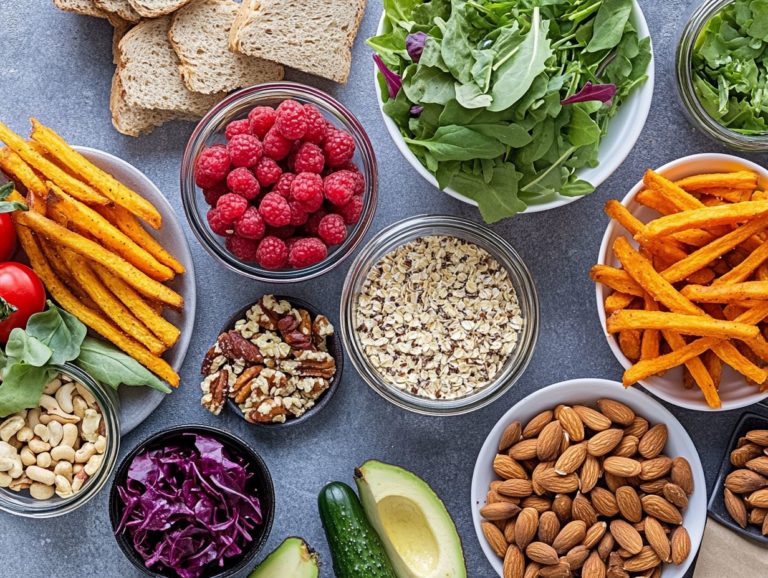How Do I Improve My Gut Health?
Gut health is essential to your overall well-being, impacting everything from digestion to mental clarity. The gut microbiome is complex, illustrating how the balance of bacteria within your body influences both your physical and emotional states.
This article delves into the signs of poor gut health and offers practical strategies to improve it through diet, supplements, and effective stress management. You ll discover fascinating connections between your gut and brain.
Small changes can lead to big improvements in your health!
Contents
- Key Takeaways:
- The Importance of Gut Health
- Signs of Poor Gut Health
- Ways to Improve Gut Health
- The Gut-Brain Connection
- Maintaining Good Gut Health
- Frequently Asked Questions
- How Do I Improve My Gut Health?
- What types of food should I include in my diet to improve gut health?
- How does stress affect gut health?
- What lifestyle changes can I make to improve my gut health?
- Are there any supplements that can help improve gut health?
- How long does it take to see improvements in gut health?
Key Takeaways:

- Eating a balanced diet rich in fiber, probiotics, and prebiotics can improve gut health.
- Finding ways to manage stress, such as exercise and mindfulness, can positively impact gut health.
- Prioritizing mental health can improve gut health due to the strong connection between the two.
The Importance of Gut Health
Gut health is crucial for your overall well-being, affecting digestion, systemic health conditions, immune function, and mental clarity.
With trillions of microorganisms residing in your gut microbiome, understanding how these bacteria interact with your diet can guide you in making informed dietary changes that foster a balanced intake of probiotics and prebiotics. Probiotics are live bacteria that benefit your health, while prebiotics are types of fiber that feed these good bacteria.
By prioritizing whole foods and dietary fiber, you can support optimal digestive health and enjoy the numerous benefits that come with a thriving gut ecosystem. This holistic approach paves the way for enhanced wellness strategies and a healthier lifestyle overall.
Understanding the Gut Microbiome
The gut microbiome is a fascinating community of trillions of microorganisms, including bacteria, fungi, and viruses, all of which play a crucial role in your digestive health and overall well-being.
These tiny allies contribute to numerous bodily functions, from breaking down food to regulating your immune system. Maintaining a critical balance is vital. Beneficial bacteria aid digestion and fend off harmful pathogens, while harmful bacteria can lead to inflammation and disease.
To nurture this balance, incorporate probiotics and prebiotics into your diet:
- Probiotics, found in delightful options like yogurt, kefir, and fermented vegetables, introduce beneficial bacteria to your system.
- Prebiotics, present in foods such as garlic, onions, and bananas, provide essential nourishment for these healthy microbes.
Together, they cultivate a thriving gut microbiome, ultimately enhancing your overall health and immunity.
Signs of Poor Gut Health
Recognizing the signs of poor gut health is crucial for addressing underlying gastrointestinal issues and preserving your digestive well-being. Symptoms can manifest in various ways, affecting both physical and mental health.
Common digestive indicators, such as bloating, constipation, and food intolerances, may suggest an imbalance in your gut microbiota. This often requires dietary adjustments, such as incorporating a high-fiber diet and embracing healthier habits.
Ignoring these signals could lead to long-term health consequences, including chronic conditions. Prioritizing gut health now means investing in a better future for your overall wellness.
Common Symptoms and Indicators
Common symptoms tied to poor gut health may appear as digestive issues like bloating, gas, and irregular bowel movements, but they don t stop there. You might also experience fatigue and mental fog.
These disturbances often stem from an imbalanced gut microbiome. When harmful bacteria outnumber beneficial ones, discomfort and irregular digestion can ensue. Your food choices and dietary habits are pivotal in shaping your gut health.
For example, indulging in a diet rich in processed foods can disrupt your microbiome, while a fiber-rich diet nurtures the growth of beneficial bacteria.
Incorporating stress management techniques, such as mindfulness and regular exercise, is essential for maintaining a harmonious gut. Chronic stress can amplify digestive troubles and negatively affect your gut flora, underscoring the profound connection between mental well-being and gastrointestinal health.
Don’t ignore these signs! Address your gut health today for a better tomorrow.
Ways to Improve Gut Health

Eating a high-fiber diet with whole and fermented foods can greatly improve your gut health. This approach nourishes beneficial bacteria in your gut microbiome and can be transformative.
Foods rich in dietary fiber such as fruits, vegetables, whole grains, and legumes serve as prebiotics, feeding these good bacteria and promoting their growth.
Fermented foods like yogurt, kefir, sauerkraut, and kimchi introduce live probiotics, which are beneficial bacteria that improve your digestive system and restore balance.
Making these simple dietary shifts not only supports digestion but also strengthens your immune system and reduces inflammation, paving the way for overall well-being.
Probiotics and Supplements
Probiotics are essential for promoting gut health. These live bacteria and active cultures help restore balance to a disrupted microbiome, improving digestion and strengthening your immune system.
Certain probiotic strains, such as Lactobacillus rhamnosus, can alleviate gastrointestinal issues, while Bifidobacterium longum enhances immune responses.
In today s market, you ll find various probiotic supplements with unique combinations of strains tailored to specific health concerns. For example, formulations that emphasize gut-brain interactions may benefit those with irritable bowel syndrome.
Start adding these beneficial bacteria to your daily routine to feel a noticeable difference in bloating, nutrient absorption, and overall well-being.
Stress Management
Effective stress management techniques are vital for preserving your gut health. Stress can disrupt the gut microbiome and overall digestive function.
Recognizing the link between mental and physical health highlights the importance of incorporating strategies like mindfulness, regular exercise, and intentional dietary choices into your daily routine.
Mindfulness cultivates a calming state that positively influences gut flora, enhancing both mental clarity and digestive efficiency.
Engaging in physical activity curbs stress hormones and promotes the growth of beneficial gut bacteria.
Making dietary adjustments, including probiotic-rich foods, can also impact your gut health and create a positive feedback loop that boosts mental health.
The Gut-Brain Connection
The gut-brain connection illustrates how closely your mental health is intertwined with your gut health. This connection influences both emotional well-being and various physiological processes.
How Mental Health Affects Gut Health

Mental health significantly impacts gut health, with stress and emotional factors often leading to digestive issues and altering your gut microbiome.
Hormonal changes and your body’s stress response primarily mediate this connection. When you face anxiety or prolonged stress, cortisol and other stress hormones can disturb the delicate balance of gut bacteria, leading to symptoms like bloating and irritable bowel syndrome (IBS).
To combat these effects, act now to adopt wellness strategies such as:
- Mindfulness practices
- Regular exercise
- A balanced diet rich in probiotics
These approaches enhance your mental well-being and help restore gut health, promoting a holistic path to overall wellness.
Maintaining Good Gut Health
Maintaining optimal gut health requires a steadfast commitment to lifestyle habits and informed dietary choices that nurture a balanced gut microbiome and promote overall wellness.
This journey involves practices that support your body’s ecosystem, ensuring you thrive in both body and mind.
Lifestyle Habits for Long-term Gut Health
To maintain long-term gut health, prioritize a balanced diet and healthy habits. This can greatly reduce your risk of digestive issues.
Include a variety of whole foods in your meals. These foods provide the nutrients that support the good bacteria in your gut.
Fiber-rich fruits, vegetables, and whole grains help digestion and encourage beneficial bacteria to thrive.
Don t forget fermented foods like yogurt, sauerkraut, and kombucha. They introduce good bacteria to your gut.
Regular exercise and stress management through mindfulness or yoga can also enhance your digestive health. Embrace these choices for a healthier gut and overall well-being!
Frequently Asked Questions
How Do I Improve My Gut Health?
To improve gut health, maintain a balanced diet, reduce stress, and stay active.
What types of food should I include in my diet to improve gut health?

Fiber-rich foods like fruits, vegetables, and whole grains feed good bacteria in your gut. Probiotic foods like yogurt and kimchi also help boost gut health.
How does stress affect gut health?
Chronic stress can upset the balance of bacteria in your gut, leading to digestive problems and a weakened immune system. Managing stress through exercise, meditation, or therapy is vital.
What lifestyle changes can I make to improve my gut health?
Along with a healthy diet, regular exercise and sufficient sleep are key to a healthy gut. Avoid smoking and limit alcohol for better results.
Are there any supplements that can help improve gut health?
Probiotics and prebiotics can boost good bacteria growth in your gut. Consult a healthcare professional before adding supplements to your routine.
How long does it take to see improvements in gut health?
Improvement timelines vary per person. Changes might take a few weeks to months, depending on individual diet, lifestyle, and health.





